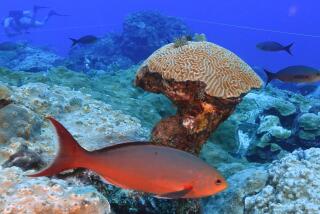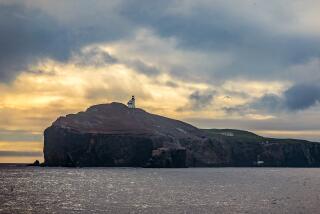Fish Are the Earth’s Canaries
- Share via
When the first captains ventured out to fish the Georges Bank off New England, they found schools of fish so thick that they appeared to be shoals of sand. The fishery created great wealth and sustained the fishing villages of New England for centuries. Fecund and abundant, the Georges Bank seemed inexhaustible.
But between 1970 and 1990, more boats and more modern methods of fishing put the resource under pressure, and traditional methods of fishery management proved powerless to halt the decline. By the early 1990s, the fishery had been virtually destroyed, and valuable species were commercially extinct. In 1996, large portions of the Georges Bank were closed to fishing--permanently. Fishing as a way of life was gone forever.
What happened at Georges Bank is happening in the waters of the Channel Islands off Santa Barbara. The marine environment there is one of the richest in the world, but every indication is that it’s headed for disaster.
The overall tonnage of fish harvested has declined by 80% since 1976. Abalone, once so numerous that they lined the ocean bottom like cobblestones, have disappeared. Some species of rockfish are close to extinction, and the fate of most other species is problematic. It’s quite possible that the waters around the Channel Islands will become, like Georges Bank, an oceanic desert.
Commercial fishermen and environmental groups have spent two years hashing out an innovative approach to marine conservation in the Channel Islands waters. This cooperative effort has produced a plan that would establish a system of no-fishing zones where the marine environment could be stabilized, studied and perhaps restored to its former abundance. The proposed marine reserves would include from 12% to 30% of the waters within the Channel Islands National Marine Sanctuary. Because the proposal is innovative, it is controversial. The state Fish and Game Commission held hearings on it; a decision is expected soon.
Surprisingly, opposition to marine reserves is muted among commercial fishermen. They can see the fish disappearing and the catch declining. They know something new must be done, because the traditional methods of management aren’t working.
The real opposition to marine reserves comes from recreational anglers, who are vociferous and persistent, and their numbers give them substantial clout with the politicized commission.
The anglers’ emotional reactions are understandable. Each fisherman takes only a few fish on each outing, so it’s hard to believe there could be a substantial impact from that. But there are a lot of anglers. Collectively, they have an impact equal to commercial fishermen. The bocaccio, for example, a highly desirable rockfish among anglers, hasn’t been fished commercially for decades. But recreational fishing has reduced it to 4% of its former numbers.
Any decision will be controversial. Still, the commission has a responsibility that goes beyond the political. The lesson of Georges Bank is that it is possible to destroy the future, to rob future generations of what should have been their heritage. The proposed reserves would provide refuge for valuable species. They would allow complex oceanic ecosystems to recover and flourish. And they would provide an invaluable picture of the undisturbed living sea, against which the true scale of human impacts could be measured.
Fishermen, environmentalists, scientists and the public would all benefit from the establishment of marine reserves within the Channel Islands National Marine Sanctuary.
More to Read
Sign up for Essential California
The most important California stories and recommendations in your inbox every morning.
You may occasionally receive promotional content from the Los Angeles Times.









